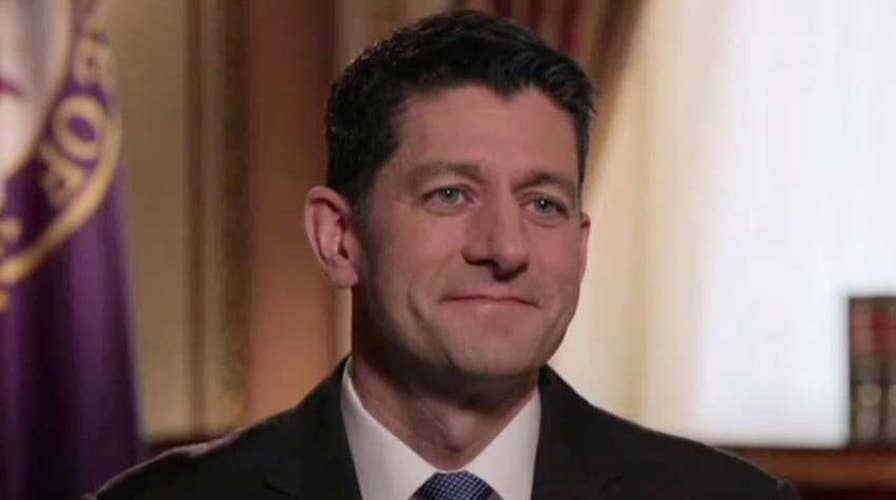Paul Ryan: Plan for implementing Trump's agenda is on track
House speaker talks canceling Obama regulations, replacing ObamaCare and more on 'Hannity'
House Speaker Paul Ryan doesn’t speak French. He studied German at Miami University in Ohio. The Wisconsin Republican describes himself as a “bad” hockey player, too, sustaining a nasty scar that required stitches after getting clipped while involved in a pickup game in college.
But Ryan didn’t let his language nor hockey failings interfere during his recent meeting with bi-lingual Canadian Prime Minister Justin Trudeau. Ryan made sure to let Trudeau know that he represents Wisconsin, a border state.
“I’m your neighbor, just across the lake,” said Ryan. He then told Trudeau that not only is the United States’ Canada’s biggest trading partner, but trade with Canada dominates business in the upper Midwest.
“The only problem we have is you steal our good hockey players,” Ryan told Trudeau.
A trade imbalance? Perhaps Ryan might consider implementing the controversial border-adjustment tax so the U.S. reaps some benefit from the Canadians pilfering American hockey players.
“It’s not our fault they want to come play for us,” Trudeau replied. “We have better teams.”
What is this? Fake news? Alternative facts? Even from Justin Trudeau?
The best team in the National Hockey League this year is Washington Capitals. No Canadian team has hoisted the coveted Stanley Cup since the Montreal Canadians defeated the Los Angeles Kings in 1993.
Sacre bleau.
It’s unclear if Ryan will ultimately advocate the border-adjustment tax to compensate the U.S. for hockey player losses. But according to many Republicans, the tax is essential for helping the math work as they try to retrench the U.S. tax code and also repeal and replace ObamaCare.
Border adjustment fees are taxes the U.S. could potentially slap on imports. Such a plan could significantly help the U.S. cover spikes in the federal deficit prompted by lower taxes and a gigantic hole left in federal revenues should Congress repeal ObamaCare.
However, the downside of a border adjustment tax is that American consumers will pay more for imported products. Cars. Smart phones. You name it.
Border adjustments aren’t new. Some U.S. trading partners impose similar levees on American exports. Advocates argue that the border-adjustment tax could bolster the strength of the U.S. dollar, offsetting the costs of the more expensive imports.
But retailers are balking at the idea, fretting over prospects of marketing more expensive goods. One wonders if supposedly free-market congressional Republicans may have to offer subsidies to firms to cover the costs of sales losses created by high prices.
That’s to say nothing of the prospect of lawmakers leaning on the Federal Reserve to implement policies to make sure the dollar muscles up against competing currencies.
Lawmakers may not eventually go with a border-adjustment tax. But the challenge to revamping the tax code and repealing and replacing ObamaCare is centered on the financial ledger.
The equation is rather simple. Lawmakers could simplify the tax code and lower taxes -- but face exploding deficits. Repealing and replacing 2010 health care law, commonly referred to as ObamaCare, offers its own legislative challenges.
But the bookkeeping is essential. Many lawmakers are leery of repealing the law without substituting its taxes with something else.
This is why repeal and replace could take a while to sort out.
House Republicans convened a big meeting just before lawmakers left Washington last week to outline the general approach.
House Ways and Means Committee Chairman Kevin Brady, R-Texas; Energy and Commerce Committee Chairman Greg Walden, R-Oregon; and Health and Human Services Secretary Tom Price all presented outlines for the path ahead.
The presentations were said to be “in depth” and reflected “replacement proposals detailed” in Ryan’s “A Better Way” agenda.
But most congressional Republicans left the conclave with few specifics. GOP leaders remain optimistic they can conjure up the votes to pass both plans. But many rank-and-file Republicans remain skeptical.
“They told us nothing,” complained one Republican, who asked for anonymity after the health care huddle. “I know as much now as I knew in November.”
After the November election, there was some talk that Republicans might repeal and replace ObamaCare just days after the Congress started in January or certainly after President Trump took office. Then there was talk about February.
Now lawmakers are at home -- on the first major congressional recess of the year -- without having hit that goal.
Ryan now says Republicans are on a “200 day” roadmap to working through repealing and replacing ObamaCare. He noted at a press conference a few weeks ago that the GOP would “advance” a health care measure in the first quarter of the year.
Otherwise, Republicans are left trying to explain the arcane, complicated budget framework Congress approved that would eventually help them set the stage to repeal and replace Obamacare.
“We’ve passed a FY ‘17 budget reconciliation package,” Rep. Evan Jenkins, R-W.V., said about the framework congressional Republicans intend to use.
The problem is that most voters have little idea what a “FY ’17 budget reconciliation package” is or what it has to do with ObamaCare.
The parliamentary secret is that a “reconciliation” measure enables Senate Republicans to turn off inevitable Democratic filibusters as they try to undo ObamaCare.
So, Republican leaders armed their lawmakers with 19 pages of talking points and data about ObamaCare in preparation for the congressional break.
There was information about subsidies for the poor. Incentives for people to stash away cash for future medical issues. Substantial changes in Medicaid. No more tax penalties for those who elect not to carry insurance. Information on “risk pools,” which deal with the chronically sick.
Aides emailed reporters “readouts” from the meeting.
But some skeptical lawmakers viewed the session as much more than a pep rally.
“They’re losing momentum, and they’re trying to create it,” said one Republican congressional source.
Rep. Raul Labrador, R-Idaho, wondered whether Republicans were just switching out ObamaCare with what he termed “Obamacare-lite.”
“Were we just against ObamaCare because it was proposed by Democrats?” he asked. “If that’s our position, then we’re hypocritical.”
But others are more confident.
House Education and the Workforce Committee Chairwoman Virginia Foxx, R-N.C., met with Vice President Trump at the Capitol just before the recess. When asked about the prospects for a replacement bill, Foxx replied she was “sure” one was in the works.
“I think we’re on the calendar to get things done before the Easter break, don’t you think?” she proffered.
The House Republican leadership knows it has a narrow window to tackle Obamacare -- before Congress gets bogged down in trying to fund the government and grappling with the debt ceiling.
The government is funded through April 28. Congress must begin cranking out individual spending bills to fund the government beyond the start of fiscal 2018, October 1.
The debt limit (the total balance the federal government can carry at any one time) is suspended until mid-March. It’s believed that deadline can float until summer.
Meantime, the Senate is bogged down in confirmation hell. It’s likely the chamber will spend much of March the same way it spent January and February: confirming Cabinet and Executive branch officials.
Democrats are slowing down those nominations. Confirmation hearings for Supreme Court nominee Judge Neil Gorsuch start March 20. Floor debate and a final confirmation vote for Gorsuch probably doesn’t come until mid- or late-April.
The calendar is brutal and gives little margin for error.
“I’m worried about the timeline,” conceded Rep. Jeff Duncan, R-S.C. “The longer we wait here, the longer it takes and we get involved with the CR (continuing resolution to fund the government) and the debt ceiling.”
What this all comes down to is giving Trump a win or two on the scoreboard. Big things take time. But so far, Congress has little to show for their efforts. And just voting to avoid a government shutdown when Republicans control the House, Senate and White House isn’t exactly the same as capturing the Stanley Cup.
A Stanley Cup, which U.S. teams have won for the past 24 years. Not just with American players, but with those from Canada, Finland, Sweden (gulp) and Russia (gulp).
But it might not matter if lawmakers do finish tax reform or repeal and replace ObamaCare. Perhaps congressional Republicans and Trump can just say they did.
After all, didn’t Justin Trudeau just say Canadian teams are better than American teams?





